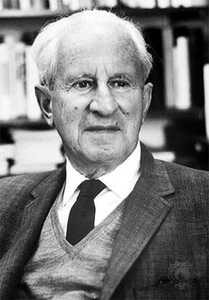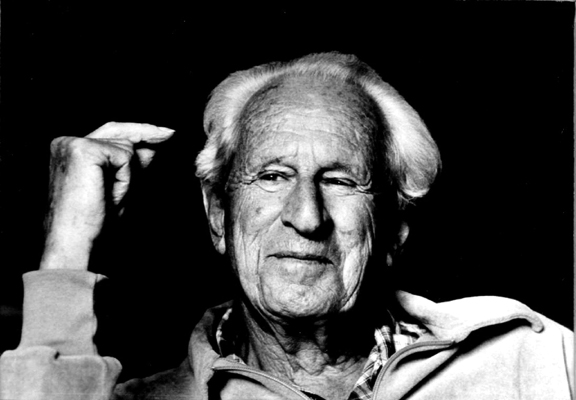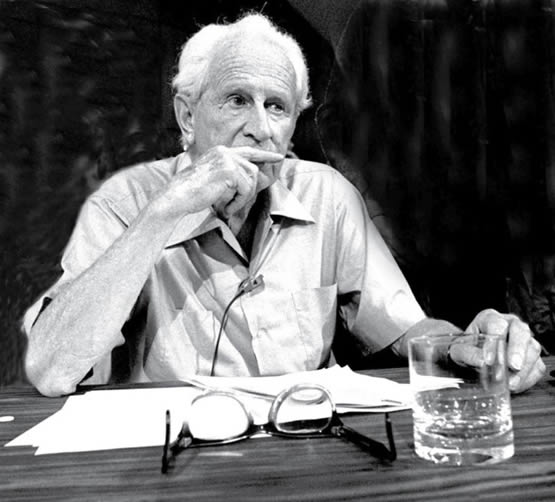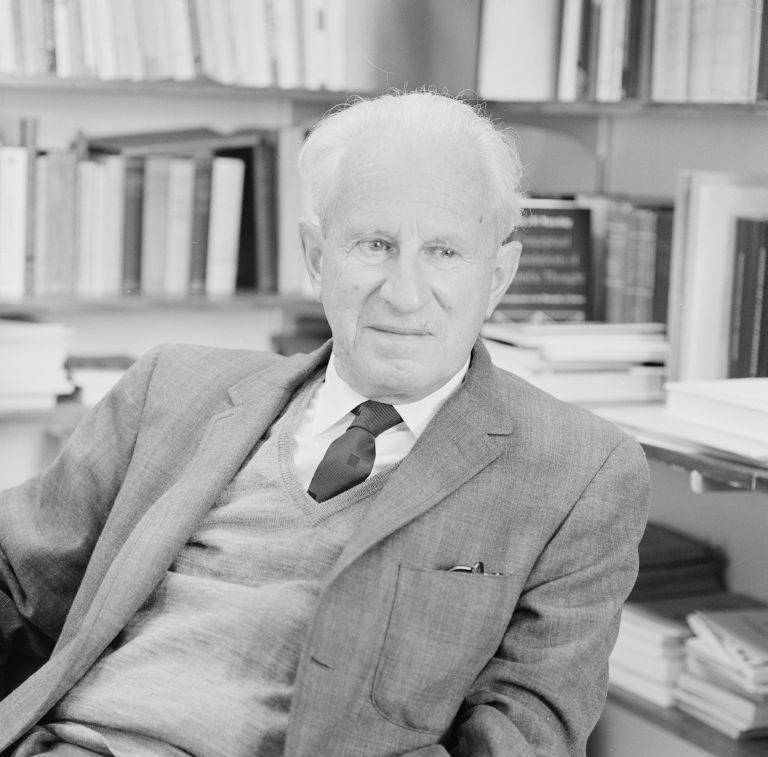<Back to Index>
- Philosopher, Sociologist and Political Theorist Herbert Marcuse, 1898
PAGE SPONSOR


Herbert Marcuse (July 19, 1898 – July 29, 1979) was a German Jewish philosopher, sociologist and political theorist, associated with the Frankfurt School of critical theory. Active in the United States after 1934, his intellectual concerns were the dehumanizing effects of capitalism and modern technology. Celebrated as the "Father of the New Left," his best known works are Eros and Civilization (1955) and One - Dimensional Man (1964). His Marxist scholarship inspired many radical intellectuals and political activists in the 1960s and '70s, both in the U.S. and internationally.
Herbert Marcuse was born in Berlin to Carl Marcuse and Gertrud Kreslawsky and raised in a Jewish family. In 1916 he was drafted into the German Army, but only worked in horse stables in Berlin during World War I. He then became a member of a Soldiers' Council that participated in the aborted socialist Spartacist uprising. He completed his Ph.D. thesis at the University of Freiburg in 1922 on the German Künstlerroman after which he moved back to Berlin, where he worked in publishing. In 1924 he married Sophie Wertheim, a mathematician. He returned to Freiburg in 1928 to study with Edmund Husserl and write a Habilitation with Martin Heidegger, which was published in 1932 as Hegel's Ontology and Theory of Historicity. This study was written in the context of the Hegel renaissance that was taking place in Europe with an emphasis on Hegel's ontology of life and history, idealist theory of spirit and dialectic. With his academic career blocked by the rise of the Third Reich, in 1933 Marcuse joined the Frankfurt Institute for Social Research.
In 1933, Marcuse published his first major review, of Marx's Economic and Philosophical Manuscripts of 1844. In this review, Marcuse revised the interpretation of Marxism, from the standpoint of the works of the early Marx. This review helped the world see that Marcuse was becoming one of the most promising theorists of his generation.
While a member of the Institute of Social Research, Marcuse developed a model for critical social theory, created a theory of the new stage of state and monopoly capitalism, described the relationships between philosophy, social theory and cultural criticism, and provided an analysis and critique of German fascism. Marcuse worked closely with critical theorists while at the Institute.
After emigrating from Germany in 1933, in 1934, Marcuse immigrated to the United States, where he became a citizen in 1940. Although he never returned to Germany to live, he remained one of the major theorists associated with the Frankfurt School, along with Max Horkheimer and Theodor W. Adorno (among others). In 1940 he published Reason and Revolution, a dialectical work studying G.W.F. Hegel and Karl Marx.
During World War II Marcuse first worked for the U.S. Office of War Information (OWI) on anti - Nazi propaganda projects. In 1943 he transferred to the Office of Strategic Services (OSS), the precursor to the Central Intelligence Agency. His work for the OSS involved research on Nazi Germany and denazification. After the dissolution of the OSS in 1945, Marcuse was employed by the U.S. Department of State as head of the Central European section, retiring after the death of his first wife in 1951.
In 1952 he began a teaching career as a political theorist, first at Columbia University, then at Harvard University, then at Brandeis University from 1958 to 1965, where he taught philosophy and politics, and finally (by then he was past the usual retirement age), at the University of California, San Diego. He was a friend and collaborator of the political sociologist Barrington Moore, Jr. and of the political philosopher Robert Paul Wolff, and also a friend of the Columbia University sociology professor C. Wright Mills, one of the founders of the New Left movement.
In the post war period, Marcuse was the most explicitly political and left wing member of the Frankfurt School, continuing to identify himself as a Marxist, a socialist and a Hegelian.
Marcuse's critiques of capitalist society (especially his 1955 synthesis of Marx and Freud, Eros and Civilization, and his 1964 book One - Dimensional Man) resonated with the concerns of the student movement in the 1960s. Because of his willingness to speak at student protests, Marcuse soon became known as "the father of the New Left in the United States", a term he strongly disliked and disavowed. His work heavily influenced intellectual discourse on popular culture and scholarly popular culture studies. He had many speaking engagements in the U.S. and Europe in the late 1960s and 1970s. He became a close friend and inspirer of the French philosopher André Gorz.
Marcuse defended the arrested East German dissident Rudolf Bahro (author of Die Alternative: Zur Kritik des real existierenden Sozialismus [trans., The Alternative in Eastern Europe]), discussing in a 1979 essay Bahro's theories of "change from within".
Jesuit Fr. James Chevedden made a written complaint to the Superior General of the Jesuit Order, Peter - Hans Kolvenbach, regarding the promotion of the ideology of the Marxist philosopher, Herbert Marcuse at the 1998 California Jesuit Province Social Pastoral Conference.
Many radical scholars and activists were influenced by Marcuse, such as Angela Davis, Abbie Hoffman, Rudi Dutschke and Robert M. Young. Among those who critiqued him from the left were Marxist - humanist Raya Dunayevskaya, fellow German emigre Paul Mattick, both of whom subjected One - Dimensional Man to a Marxist critique, and Noam Chomsky, who knew and liked Marcuse "but thought very little of his work." Marcuse's 1965 essay "Repressive Tolerance", in which he claimed capitalist democracies can have totalitarian aspects, has been criticized by conservatives. Marcuse argues that genuine tolerance does not permit support for "repression", since doing so ensures that marginalized voices will remain unheard. He characterizes tolerance of repressive speech as "inauthentic." Instead, he advocates a form of tolerance that is intolerant of right wing political movements:
"Liberating tolerance, then, would mean intolerance against movements from the Right and toleration of movements from the Left."
"Surely, no government can be expected to foster its own subversion, but in a democracy such a right is vested in the people (i.e., in the majority of the people). This means that the ways should not be blocked on which a subversive majority could develop, and if they are blocked by organized repression and indoctrination, their reopening may require apparently undemocratic means. They would include the withdrawal of toleration of speech and assembly from groups and movements which promote aggressive policies, armament, chauvinism, discrimination on the grounds of race and religion, or which oppose the extension of public services, social security, medical care, etc"
Marcuse later expressed his radical ideas through three pieces of writing. He wrote An Essay on Liberation in 1969 celebrating liberation movements such as those in Vietnam, which inspired many radicals. In 1972 he wrote Counterrevolution and Revolt, which argues that the hopes of the 1960s were facing a counterrevolution from the right.
After Brandeis denied the renewal of his teaching contract in 1965, Marcuse devoted the rest of his life to teaching, writing and giving lectures around the world. His efforts brought him attention from the media, which claimed that he openly advocated violence, although he often clarified that only "violence of defense" could be appropriate, not "violence of aggression." He continued to promote Marxian theory, with some of his students helping to spread his ideas. He published his final work The Aesthetic Dimension in 1979 on the role of high art in the process of what he termed "emancipation" from bourgeois society.
Marcuse married three times. His first wife was mathematician Sophie Wertman (1901 – 1951), with whom he had a son, Peter (born 1928). Herbert's second marriage was to Inge Neumann (1910 – 1972), the widow of his close friend Franz Neumann (1900 – 1954). His third wife was Erica Sherover (1938 – 1988), a former graduate student and forty years his junior, whom he married in 1976. His son Peter Marcuse is professor emeritus of Urban Planning at Columbia University. His granddaughter is the novelist Irene Marcuse and his grandson, Harold Marcuse, is a professor of history at the University of California, Santa Barbara.
On July 29, 1979, ten days after his eighty - first birthday, Marcuse died after having suffered a stroke during a visit to Germany. He had spoken at the Frankfurt Römerberggespräche, and was on his way to the Max Planck Institute for the Study of the Scientific - Technical World in Starnberg, on invitation from second generation Frankfurt School theorist Jürgen Habermas. In 2003, after his ashes were rediscovered in the United States, they were buried in the Dorotheenstädtischer cemetery in Berlin.
Leszek Kołakowski described Marcuse's views as essentially anti - Marxist, in that they ignored Marx's critique of Hegel and discarded the historical theory of class struggle entirely in favor of an inverted Freudian reading of human history where all social rules could and should be discarded to create a "New World of Happiness". Kołakowski concluded that Marcuse's ideal society "is to be ruled despotically by an enlightened group [who] have realized in themselves the unity of Logos and Eros, and thrown off the vexatious authority of logic, mathematics and the empirical sciences."
During his years in Freiburg, Marcuse wrote a series of essays that explored the possibility of synthesizing Marxism and Heidegger's fundamental ontology, as begun in the latter's work "Being and Time" (1927). This early interest in Heidegger followed Marcuse's demand for “concrete philosophy,” which, he declared in 1928, “concerns itself with the truth of contemporaneous human existence.” These words were directed against the neo - Kantianism of the mainstream, and against both the revisionist and orthodox Marxist alternatives, in which the subjectivity of the individual played little role. Though Marcuse quickly distanced himself from Heidegger following Heidegger's endorsement of Nazism, it has been suggested by thinkers such as Juergen Habermas that an understanding of Marcuse's later thinking demands an appreciation of his early Heideggerian influence.
Marcuse’s analysis of capitalism derives partially from one of Karl Marx’s main concepts: Objectification, which under capitalism becomes Alienation. Marx believed that capitalism was exploiting humans; that the objects produced by laborers became alienated and thus ultimately dehumanized them to functional objects. Marcuse took this belief and expanded it. He argued that capitalism and industrialization pushed laborers so hard that they began to see themselves as extensions of the objects they were producing. At the beginning of One - Dimensional Man Marcuse writes, “The people recognize themselves in their commodities; they find their soul in their automobile, hi-fi set, split level home, kitchen equipment,” meaning that under capitalism (in consumer society) humans become extensions of the commodities that they create, thus making commodities extensions of people's minds and bodies and calling into question the notion of alienation.

